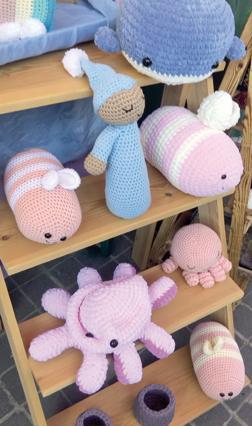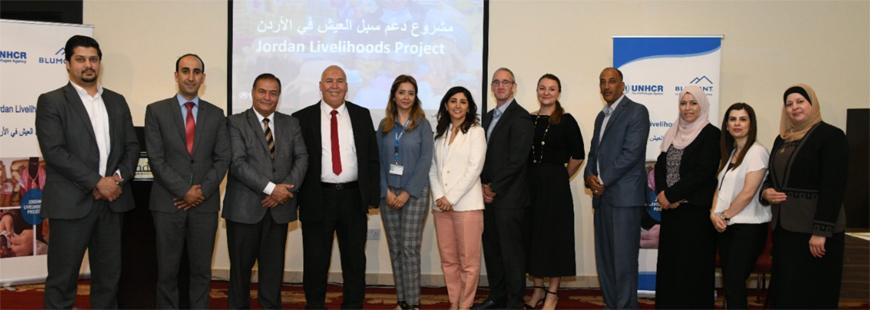You are here
Home-based businesses help refugees amid labour market challenges
By Batool Ghaith - Jun 20,2022 - Last updated at Jun 20,2022

Crochet products by a refugee are on display at a public bazaar in Amman on Monday (Photo by Batool Ghaith)
AMMAN — Long hours, low payment and the lack of overtime bonuses and proper transportation are some of the major challenges that have forced refugees to start home-based businesses.
On World Refugee Day, annually marked on June 20, refugees told The Jordan Times that the “challenging working environment” in Jordan has forced them to start their own businesses as it is “more sufficient”.
Sahar Maqlad, a 31-year-old Syrian living in Jordan, owns a home-based crocheting business, and said that having her own business is “suitable and flexible”.
“It is very difficult for me to be employed within certain working hours as I have three kids to take care of, but at the same time, I could not remain unemployed as my husband’s income does not cover all our expenses. This is what motivated me to start my business,” she told The Jordan Times.
Maqlad noted that it was “not easy” to build a clientele base and to market her business online as she is not familiar with marketing and social media.
“I started my business around June 2019. Everything was difficult in the beginning, but after a few months, I began to receive some orders. A short-while later however, unfortunately the pandemic started,” she said.
According to Maqlad, her business completely stopped in 2020 due to the lockdowns and the lack of demand.
“It was a very difficult time for us as a family, but I continued to make and share my products until I eventually started receiving orders again,” she continued.
Maqlad also noted that the lifting of pandemic restrictions means she can now participate in bazaars, which has been “very helpful to showcase the products and to connect with clients face to face”.
Syrian refugee siblings Fahed and Raghad showcased their handmade products — a modernised Damascene craft using seashells and wood— at a public bazaar in Amman on Monday.
“We use simple tools and create different products to showcase our heritage to everyone,” Fahed told The Jordan Times.
They indicated that such events and bazaars help them market their products.
Abdallah Hosni, another Syrian refugee living in Amman, who creates accessories and souvenirs from different materials, noted that it has been “extremely difficult” to get raw materials, especially amid the high shipping prices.
Hosni creates his pieces with the help of his wife and daughters.
“We all help each other to come up with new ideas and products. My daughter helps with our online page and orders,” he said.
Since July 2021, Syrian refugees have been able to get work permits in all sectors open to non-Jordanians, allowing them to work in services and sales, crafts, as skilled agricultural, forestry and fishery workers, plant and machine workers and in basic industries, according to the UNHCR.
Ali, a Syrian refugee working in a restaurant in Amman, expressed his hope that refugees will be allowed to work in more fields in Jordan.
“I have a BA in business administration and it is unfortunate that I am not able to use my skills and what I learned. I really hope the government considers opening more sectors for non-Jordanians,” Ali told The Jordan Times.
Related Articles
AMMAN — UNHCR Jordan and Blumont, an NGO that provides relief for refugees and host populations, on Wednesday signed six agreements with var
AMMAN — Refugees from five different countries gathered on Thursday for the start of the UN agency’s #WithRefugees Winter Bazaar.Handmade cl
AMMAN — Abeer, a 36-year-old Jordanian woman and mother of four, was forced to take control of her family’s finances after the death of her



















